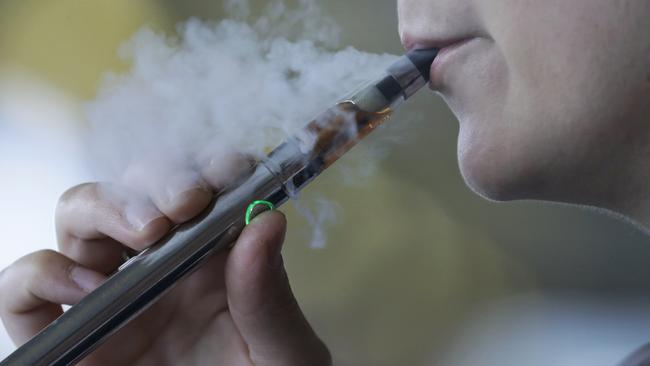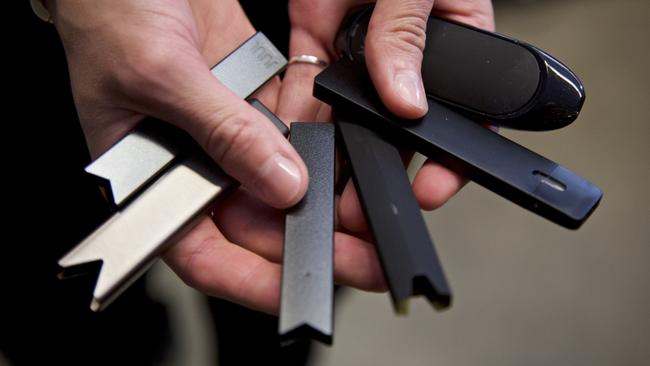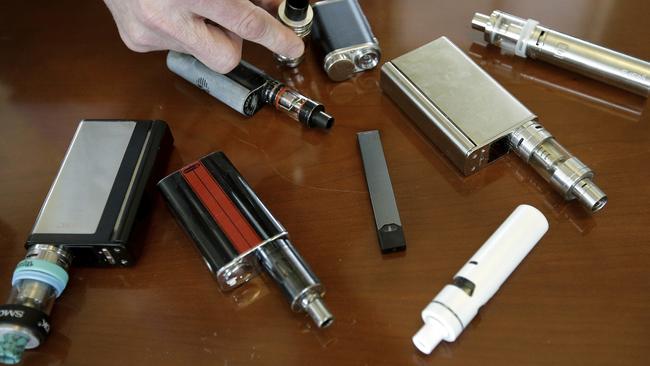Top Melbourne private school Xavier College in vaping crackdown
Top Melbourne private school Xavier College has sent a note to parents stressing the dangers of vaping, amid a school-wide ban on the e-cigarettes, which can be easily disguised as pens or USB sticks.

Education
Don't miss out on the headlines from Education. Followed categories will be added to My News.
It comes amid mounting concerns here and overseas about the rise of vaping, and the practice undermining anti-smoking campaigns, which have reduced cigarette smoking and aggressive marketing of e-cigarettes to impressionable teens.
The Kew-based Catholic boys school said it was “aware that this practice is becoming common among students in schools, both in our local area and throughout the Western world”.
“In fact, the number of teenagers using e-cigarettes worldwide has doubled in the last two years,” the school said in a note to families in which it sought to recruit them to continue the conversation at home.
“As a relatively new technology, there is less widespread knowledge of the practice and the potential harmful impacts of vaping on users.
“In the spirit of working in partnership to educate our students so they may be the best version of themselves, we are writing to briefly outline some information regarding vaping and e-cigarettes, so that you may inform yourselves and discuss vaping within your households.”
Penned by the head of students and head of student culture, it said students caught using e-cigarettes would be penalised in the same manner as students using conventional smokes.
The school said it was a smoke-free environment and students were prohibited from smoking during any school activity, while they were in school uniform or in a situation where they could be linked with the school.

It warned that “significant consequences will ensue for any student found vaping at school or in school uniform, or possessing vaping paraphernalia at school, as it constitutes a serious breach of our behaviour policy”.
E-cigarettes are electronically powered smoking devices filled with a liquid that generally contains nicotine, flavourings and other chemicals.
“The liquid is vaporised and the vapour is inhaled by the user. It can take as little as three seconds to vape, and the e-cigarette does not produce the lingering smell associated with a traditional nicotine-based product,” the note from the school said.
“Some e-cigarettes look like their more familiar tobacco counterparts. However, e-cigarettes can also look like pens, USB memory sticks or other rectangular electronic devices. The ‘Juul’ brand of e-cigarette houses the nicotine liquid in a small ‘pod’ that can be attached to the re-usable smoking devices, with the capsule being purchased online in much the same way as one might purchase coffee pods. Given the appearance of e-cigarettes, the speed with which they can be used and the minimal odour they produce, it can be very difficult to monitor student usage.”
MORE: HACKS TO GET YOU READY FOR HIGH SCHOOL
SCHOOL TELLS KIDS TO TAKE THEIR RUBBISH HOME
FORTNITE GAMING BLAMED FOR SCHOOL STRUGGLES
In Australia, e-cigarette products containing nicotine are illegal without a prescription. But these products are readily available online.
The school said it had been discussing the issue at its senior campus to assist with the education of students on the harmful effects of the practice.
“Essentially, we want our students to know that vaping is very bad for your health.
“Nicotine is the primary substance used in e-cigarettes and it is highly addictive and toxic. It can slow the brain development in young people affecting their memory, concentration, learning and mood.
“Some e-cigarettes use extra strength cartridges which means the user intakes more nicotine than they would with a tobacco product.
“They are not a ‘healthy’ alternative to smoking tobacco-based products.
“Because vaping is new, the short and long-term health effects remain unknown,” the school said.

The school also called out the “sophisticated marketing campaign in an attempt to
glamorise and promote smoking to young people”.
In separate correspondence to parents of its Brighton middle years campus, Kostka Hall, it said that a survey of students showed that 98 per cent of Year 7s and 96 per cent of Year 8s said they did not smoke.
It said that many teens thought that vaping was less harmful than smoking because it was often formulated with flavourings to appeal to younger users.
Quit Victoria director Dr Sarah White said there was mounting evidence overseas about potential for harm.
“What we are seeing overseas is a term being coined called VALI which is vaping associated lung injury,” she said.
This referred to a collection of illnesses caused by inhaling chemicals.
Dr White said there had been a theory that if people were smoking nicotine cigarettes that replacing it with vaping might be less harmful.
But cautioned it could be the difference between jumping off 10th floor and jumping off the 8th floor.
“The message is really clear. If you are not a smoker don’t go near them,” she said.
Dr White said manufacturers were creating products that could be passed off as USB sticks and did not smell so it was harder for parents to be vigilant.
She said there was a thought that metropolitan teens were earlier adopters and they might have access to more money and be able to receive online parcels without their carers knowing.
WHAT IS VAPING?
E-CIGARETTES simulate smoking, but you don’t burn tobacco when you use them. An e-cigarette is a battery-powered device that heats liquid into a vapour, which you then inhale into your lungs.
INHALING vapour from an e-cigarette is known as ‘vaping’. When smoking an e-cigarette, the user inhales and exhales the vapour, which looks similar to cigarette smoke.
THE liquid used in e-cigarettes may or may not contain nicotine.
IN Victoria, it is generally illegal to sell, possess or use liquid containing nicotine in an e-cigarette.
E-CIGARETTE liquid not containing nicotine can be legally sold, possessed and used in Victoria (as long as it does not contain any other illegal ingredients).
E-CIGARETTES cannot be used in areas where smoking is banned, cannot be displayed at retailer outlets, and cannot be sold to people under 18 years. E-cigarettes cannot be used in outdoor dining areas.
THE full health impacts of e-cigarettes are not yet known, however potential dangers include faulty parts, potentially flammable lithium batteries and ingestion (swallowing) of e-liquid which can lead to poisoning and even death in children.
SOURCE: Better Health Channel, Victorian Government
